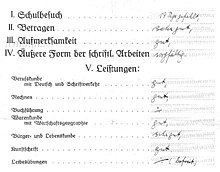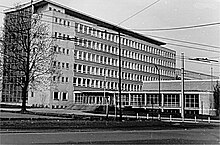Konrad Klepping Vocational College
| Konrad Klepping Vocational College | |
|---|---|
| type of school | Vocational college |
| School number | 180051 |
| founding | 1888 |
| address |
Geschwister-Scholl-Strasse 1 |
| place | Dortmund |
| country | North Rhine-Westphalia |
| Country | Germany |
| Coordinates | 51 ° 31 '4 " N , 7 ° 28' 25" E |
| student | approx. 2500 |
| Teachers | about 80 |
| Website | konrad-klepping-berufskolleg.de |
The Konrad Klepping Vocational College (KKB) is a fully developed commercial vocational college in which, in addition to vocational qualifications, all general educational qualifications can be obtained in Dortmund.
The namesake " Konrad Klepping " - Hanseatic merchant and pioneer of banking - stands for tradition and a future orientation in vocational training appropriate to the time .
history
- In 1888, increasing complaints about the inadequacies in theoretical training lead to the establishment of a “commercial advanced training school” in evening form. The sponsors are the Chamber of Commerce and the City of Dortmund . A compulsory education does not yet exist.
- In 1899, a full-time school, the higher commercial school, is also established . Initially, it is only approved for male students.
- In 1905, compulsory vocational training for the “commercial advanced training school” was enforced in the German Reich.
- In 1907 girls can attend the two types of school established.
- In 1910 the new vocational school was called "Municipal Commercial Teaching Institutes". A one-year commercial school is now being added to it as a kind of feeder - initially only for girls. But just a year later, the realization that there are also boys who cannot get through an apprenticeship without basic education - a two-year course - "commercial school" is emerging.
- In 1926, for the first time, the various commercial schools that belonged together, which had previously worked at 14 locations, were also spatially combined. A new building on Gronaustraße becomes the origin of today's center of the vocational college.
- In 1933 director Dr. May, according to the conference protocol, the "victory of the national revolution in the entire German-speaking area". The teachers are encouraged to pay attention to the "German greeting". As early as October 11, 1933, “ Mein Kampf ” and “Introduction to Racial Studies” were recommended for teaching. In the full-time schools, the school no longer concentrates on the higher commercial school, but on the commercial school, which concludes with the Mittlere Reife (the “ one -year-old”, entitlement to only one-year military service). The new subject “Citizenship” is created - indoctrination is made easier by the lack of such a subject in the previous curricula.
- In 1934 the Hitler Youth and the Association of German Girls ( BDM ) come to school in uniform. More than half of the students and all teachers are in Nazi organizations.
- From 1939 on, everything was dominated by war. The students are used to replace the soldiers in the shops - the lessons are irregular. For this z. B. Donations are collected for the Führer’s birthday. Boys drop out of education; they are pushed to military training.
- 1942: “Because of the lack of paper, only the bare essentials should be written,” decreed a teachers' conference.
- In 1943, because of the bombing war, 200 students from full-time schools, commercial and commercial schools, together with their teachers, who had to give “4 hours of war”, had to be evacuated to the Black Forest, to Triberg and Titisee.
- 1944: Fewer and fewer teachers, fewer and fewer schools in Dortmund. The school buildings were completely destroyed before the last major attack on the city center. After September 18, 1944, school operations are completely shut down.
- 1946: 13 female and 6 female teachers, among them also for a few months Dr. May, start teaching again at different locations. The school lunch offer is an incentive to attend school.
- In 1947, under the new headmaster Dr. Baumgardt - he also worked at the school during the Third Reich - kept civic education as "civic education" and even an examination subject. As soon as the first misery has been overcome, missed school becomes a problem. A teachers' conference decrees to proceed “as before the war”: “If a student is absent three times for business reasons, the class teacher will file a criminal complaint against the company”.
- In 1949 the banking and tax specialist classes are established. To the annoyance of many teachers, the manners of "like before the war" can no longer be enforced. The students take, it is said e.g. B., in the house "don't get your hat off your head" or "keep your hands in your pockets in the hallways" ...
- In 1950 the school with 48 teachers was still working across town. But the rebuilding of the school block on Gronaustraße begins.
- 1951 A school building on Robert-Koch-Strasse, the Berswordtschule (the Berswordt family has its roots in the Hanseatic League like the Kleppings) is made completely available to the school, once again known as the “commercial teaching institutions”. However, there are still 5 branch offices with a total of over 8,000 students. Only 8 hours of vocational school can be given.
- In 1956 the scattered offshoots come together again. A new building at the current location, Geschwister-Scholl-Strasse, makes it possible.
- In 1958, the council decides to split the “commercial teaching institutions” into two independent schools - afterwards the later KKB is run as “commercial schools I”.
- In 1960, for the first time, 4 graduates of the higher technical college for industrial clerks received the limited university entrance qualification - the way to the general qualifications at vocational schools is free.
- In 1973 the city council decreed another division. The later Konrad Klepping Vocational College kept the name "Commercial School I".
- In 1970 the school introduced the technical college for economics (grade 12).
- In 1982, after a donation from the Sparkasse, the first computers can be used for school purposes. In 2007 the KKB has more than 400 PC workstations.
- In 1999, changes in state politics in North Rhine-Westphalia, especially the Vocational College Act of 1997, lead to the conversion into the “Konrad-Klepping Vocational College”.
- In 2004 the KKB is converted into an independent school as part of the model project “Independent School North Rhine-Westphalia” .
Surname
As evidenced by the history of the city of Dortmund and the documents stored in the English State Archives Public Record Office , Konrad Klepping was an outstanding representative of the Hanseatic League , whose Dortmund section was one of the most important in the late Middle Ages , especially because of its importance for the British trade, in which it was also the first in Germany did banking on a large scale.
Konrad Klepping belonged to the consortium of Dortmund merchants, to whom all English customs revenue and the royal crown were pledged in the mid-14th century. The name Klepping also appears repeatedly in the council lists and as mayor during this heyday of the city. Konrad Klepping died in London as an adviser to the important English King Edward III.





